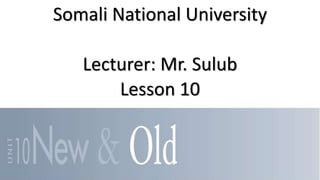
Lesson 10.pptx
- 1. Somali National University Lecturer: Mr. Sulub Lesson 10
- 67. Defining relative clauses • We use defining relative clauses to identify a thing, person, place or time.. • Relative clauses are formed with a relative pronoun and a clause: Who(for people): Here’s the man who can help you. Which(for things): The money which is not used goes back into the account. That(for people or things): I know a woman that works in a bank. It is a job that takes up a lot of time. Where(place): This is a shop where bartering is allowed. Whose(belonging to a person or thing): I don’t know whose things these are. When (time): Sunday is the day when my family get together.
- 68. Places • village • town • city • capital • state/ province • country • continent • planet
- 69. Words that mean new • Equipment, computers: advanced, cutting-edge, modern • Ideas: innovative, fresh • Films , books: latest, recent • Something just bought and never used: brand new
- 70. Definite Article: the Use the when a person or thing has been referred to before. We have found a new flat so we were painting the flat all last night. Use the when there is only one of this person or thing or it is clear which one it is. My parents met the queen once. The can also be used when it is part of a superlative phrase He is the best in the class. When it is part of a name (such as a river) The Black Sea, the Titanic, For nationalities and groups in society The British, the unemployed
- 71. Vocabulary: transport • a plane • a taxi/car • bicycle(penny farthing) • coach/bus • horse-drawn carriage • motorbike • rowing boat • train • the underground
- 72. • drive: a car, a bus • ride: a motorbike, a bicycle, the underground • get on/off: a plane, a bus, a motorbike, bicycle • get in/out of: a car Vocabulary: transport
- 73. Consonant Clusters • A consonant cluster in a word is a group of consonants with no vowels between them. The longest possible cluster in English is three consonant sounds at the start, such as 'splash', and four at the end, as in 'twelfth'. /pl/, plane /tr/, track /str/street
- 74. Words that mean make • Make is a very general word. We sometimes use words with more specific meaning that sound more natural in a particular context. Things made in factories: build, manufacture, produce Building: build Problems, changes, effects: cause, produce, generate New things: design, develop, invent,create
- 75. both, neither Use both to talk about two things. Both is used with a plural noun and a plural verb. Both cars are quite old. Use neither to say something negative about each of two things. Neither is used with a singular noun and verb. Neither car is very reliable. Use both of and neither of with a plural noun or pronoun. Neither of the cars is economical. Let us sell both of them.
- 76. Ending a conversation • I would better be going. • I really have to go now. • Sorry to rush off. • I should be going. • Bye. • Goodbye. • See you. • Ok, then.
- 77. You know We can use you know…. • For emphasis. It is a difficult test, you know. • While we think about what to say next. This is a brand new phone. It is a, you know, phone with video and music and everything. • When we are giving extra information about something. Have you seen my English book? You know, the black one. • Before we start to talk about a person or thing. You know the Japanese restaurant near the school, well, it is closing.
- 78. a/an for new information We use a/an for when we write about a singular noun for the first time. Once upon time there was a boy. I study English in a university in Mogadishu. There is an American restaurant nearby our house.
- 79. Giving reasons • We can use as or because to give reasons. I am studying English because I want to get a better job. I want to improve my English as it is very important for my work. I walked to the university as I had no money. I didn’t go to work because I was not feeling well.